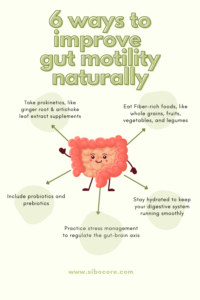Gut motility – maybe you’ve heard of it, maybe you’ve not. But do you truly understand the impact it can have on your health? When we make decisions, we say we have to listen to our gut, some people even call the it the body’s “second brain”. Not only that, the gut has an enormous importance on overall well-being, which is why it’s the topic of today’s blog. Sluggish motility can even lead to bloating, discomfort and chronic conditions. (Think of Small Intestinal Bacterial Growth and IBS). Let’s dive into what gut motility is and why it matters.
What Is Gut Motility? Understanding the Basics
Gut motility is the overall process of moving food, liquids and waste throughout the gut (source). Different places in the body have different functions, which is why it’s important that food is moved through it: so the food is broken down in the stomach and small intestine and then absorbed in the small intestine and colon. There are two processes happening at the same time that move the food:
- Peristalsis: The contraction and relaxation movements of the muscles in the walls of the gut are called ‘peristalsis’ and they’re what is guiding the food down from the moment it enters your mouth, to when it leaves the body as waste. These pushing movements are very wavelike and happen mostly in the esophagos (throat).
- Segmentation Contractions, however, happen mostly in the small and large intestine. These movements more like how a washing machine moves: slowly back- and forth. This churning helps with digestion by mixing the food with the juices in the stomach and that helps break down the food (source).

The Importance of Gut Motility for Overall Health
As you can imagine, the entire GI tract is insanely important for over health, because our entire energy system depends on it. Proper motility ensures food is in the GI tract for the correct amount of time. Nutrients like vitamins, fats, sugars and proteins all need to be absorbed from food. Motility ensures the food can be absorbed properly, because it’s in the digestive tract for the right amount of time, while also cleaning out any waste from your body. Basically, it ensures it’s at the right place, at the right time.
Both slow and fast motility can disrupt this system, with negative consequences.
- Fast motility is bad for the body, because the body doesn’t have enough time to get nutrients out of the food, before the food is released as waste. This hypermotility obviously lead to nutrient deficiencies and usually presents itself as diarrhea.
- Slow motility, on the other hand, means food stays in the digestive tract for too long. It’s also called hypomotility and can show itself as constipation and sometimes bacterial overgrowth when peristalsis doesn’t clean out the body’s waste in time.
Moreover, the movement of the gut creates an environment for beneficial bacteria to thrive, which supports immunity and brain health.
Factors That Affect Gut Motility
What are factors that can affect digestion and gut motility?
Water:

Time and time again you hear of the importance of water and it isn’t different for gut motility and the digestion process. Water is absorbed into the bloodstream in both the small and large intestines. If you don’t drink enough of it, it could lower water content in your waste, which can cause constipation. Next to that, lack of water can impact the gut microbiota and it can trigger changes in the body’s immune response (source).
Lastly, you might throw off your gut motility, because fewer peristalsis contractions happen (source). In other words, make sure to drink enough water! To do so myself, I tried tracking it with an app—and discovered I wasn’t even hitting a liter a day! Once I upped my intake, I noticed a significant improvement in how I felt.
Water digestion process works a little bit differently to food, because it only takes around 5 minutes for water to go through your entire GI tract, whereas it can take anywhere between 10 and 73 hours for food to go through your digestive tract (source).
Food and Fiber:
As food passes through the digestive tract, it interacts with the bacteria helping you out by breaking down and the organs trying to get nutrients. But are you eating the right things for good gut motility? Fiber is very often described as a type of food to eat when you are constipated and not without reason. Dietary fiber can be used to regulate gut motility (source).
Influence of stress and hormones on the gut:
Stress is also known to have a large impact on the gut, affecting both short-term and long-term health. It disrupts the brain-gut connection, known as the “brain-gut axis,” and has been linked to conditions like IBS, IBD, GERD, SIBO and other digestive disorders (source).
Stress can throw off gut motility, heighten sensitivity, disrupt the balance of gut bacteria. Next to this, it can increase intestinal permeability, which is when the lining of the small intestine gets tiny gaps, making it more open than it should be, which can cause unwanted substances to leak into the blood stream. Moreover, it can also affect how the gut regenerates and how blood flows to the digestive lining. Managing stress is clearly important for keeping your gut functioning smoothly.
Medications and medical conditions:
There are multiple medications that may affect motility (source). Drugs like metoclopramide, bethanechol and domperidone increase motility by enhancing the peristaltic contractions, whereas opiods and condition like diabets or hypothyroidism can slow down gut motility.
Signs of Poor Gut Motility You Shouldn’t Ignore
Recognizing the symptoms of motility issues early can prevent complications. Watch out for:
- Difficulty swallowing
- Choking
- Heartburn
- Burping
- Acid reflux, Nausea and Vomiting: Food that doesn’t move effectively may cause nausea or reflux.
- Regurgitation
- A feeling of early fullness: I could usually not get more food in me than 10 bites, before I felt so full that it was too uncomfortable to eat anymore.
- Stomach pain: This can be cramping or feelings of gas being stuck.
- Gas / Bloating: Trapped air or food lingering too long in the intestines can cause discomfort. I had such strong bloating that no clothing fit me anymore. Here’s what you can do if you need immediate relief.
- Abdominal cramping: Irregular contractions might lead to cramping and pain.
- Diarrhea: Rapid motility can result in watery stools and nutrient malabsorption.
- Constipation: Fewer than three bowel movements a week may indicate slow motility.
These symptoms could be caused by various conditions, such as chronic constipation, SIBO or irritable bowel syndrome (IBS).

How to Improve Gut Motility Naturally
The good news is, there are simple steps you can take to enhance gut motility:
- Include Prokinetics in your diet: There are medicine and supplements that can help regulate motility.
- Some prokinetic drugs include neostigmine, bethanechol, metoclopramide, cisapride, and loperamide (source). Please discuss with your healthcare provider if one of these would suit your specific case.
- You can also get Ginger Root and/or Artichoke Leaf Extract supplements from any drugstore. These natural supplements both work as prokinetics (source). Ginger and artichoke leaf may improve bile acid and pancreatic enzyme production, all leading to improved digestion. On top of that, ginger is protective to the musocal layer in the intestines (source). Note: artichoke itself is commonly found a high FODMAP ingredient, but because this is artichoke extract, it shouldn’t have the same properties.
The single things that made the biggest difference for me. Prokinetics let me go to the bathroom within 10 minutes after the first time I took them. I had suffered for 12 years and this was the biggest turning point.
- Eat Fiber-Rich Foods: Incorporate whole grains, fruits, vegetables, and legumes into your diet.
- Stay Hydrated: Drink plenty of water throughout the day to keep your digestive system functioning smoothly.
- Exercise Regularly: Physical activity stimulates intestinal muscles, promoting regular bowel movements.
- Practice Stress Management: Techniques like yoga, meditation, and deep breathing can regulate the gut-brain axis.
- Include Probiotics and Prebiotics: Yogurt, kefir, and fermented foods improve the gut microbiome, while prebiotics like garlic and onions nourish beneficial bacteria.
If you feel in any way unsure of how to tackle the issues, it is wise to visit a healthcare provider for some help. Word of the wise, don’t ‘just’ let them tell you you have IBS. Tests can and should be done to figure out the root cause of the issues, this is the only way to be able to tackle it fully.

Conclusion
Gut motility plays a crucial role in your digestive health and overall well-being. Understanding how it works, recognizing the signs of trouble, and taking proactive steps to improve it can make a world of difference. Whether it’s through dietary changes, stress management, or medical support, you have the power to take control of your gut health. Don’t let gut motility issues hold you back—start your journey to a healthier gut today!
